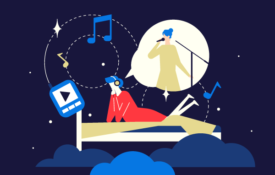-
The (Literally) Effortless Way to Learn Faster and Improve Your Memory, Backed by Science
We all have things we need to remember. A pitch. A presentation. Material for a test. So you study. You read and re-read. And highlight. And re-read again. You devote what at least feel like endless hours to
-
Ever Gotten Angry at Your Partner in a Dream and Woken Up Mad? You’re Not Alone.
It was not so much that My Lovely Wife got what’s called an undercut haircut — a style favored by “the youth” that features a partly shaved cranium — or that she dyed the resultant
-

New Research in Psychological Science
A sample of research on hallucinatory experiences, personality and memory in older adults, belief updates across the political spectrum, culture and gender inequality and well-being, pain and pleasure, neural responses to partner’s evaluations, bedtime music, and interventions to improve their choices about sharing fake news.
-

Listening to Music Near Bedtime Could Lure Sleep-Disrupting ‘Earworms’
Earworms can sometimes interject themselves into our dreams, where they can negatively impact our quality of sleep.
-

Listening to Music Near Bedtime Could Lure Sleep-Disrupting ‘Earworms’
Earworms can sometimes interject themselves into our dreams, where they can negatively impact our quality of sleep.
-

Midnight Attack of the Earworms! How Stuck Songs Sap Sleep
Michael Scullin from Baylor University talks to us about his research examining this phenomenon of sleep-disturbing earworms and how popular tunes can impact our sleep.

